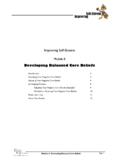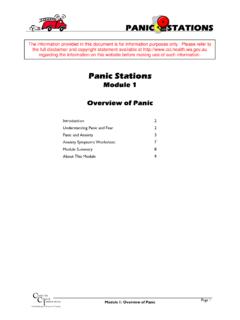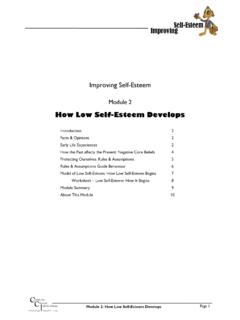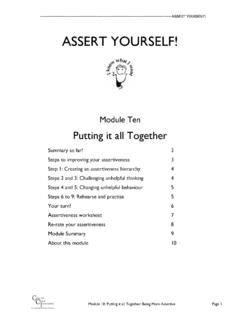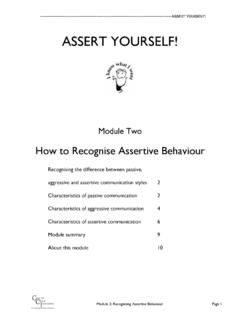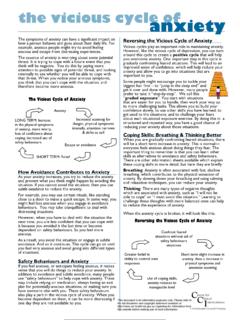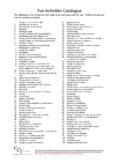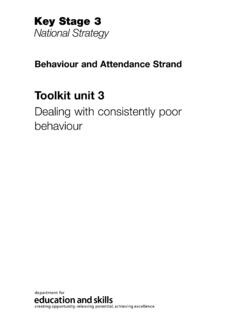Transcription of Module 2 Behavioural Strategies for Managing …
1 Page 1 Centre forClinicalInterventions Psychotherapy Research TrainingModule 2 Back from the Module 2 Behavioural Strategies for Managing depression Contents Page Behavioural Activation: Fun & Achievement 2 Fun Activities Catalogue 5 Behavioural Activation Worksheet 7 Weekly Activity Schedule 8 Module Summary 9 Page 2 Centre forClinicalInterventions Psychotherapy Research TrainingModule 2 Back from the The symptoms of depression can bring about some drastic changes in a depressed person s life, daily routines, and their behaviour. Often it is these changes that makes the depression worse and prevents the depressed person from getting better. For example, a lack of motivation or a lack of energy can result in a depressed person cutting back on their activities, neglecting their daily tasks and responsibilities, and leaving decision-making to others.
2 Have you noticed these changes in yourself when you are depressed? When your activity level decreases, you may become even less motivated and more lethargic. When you stop doing the things you used to love, you miss out on experiencing pleasant feelings and positive experiences. Your depression could get worse and this becomes a vicious cycle. Similarly, when one begins neglecting a few tasks and responsibilities at work or at home, the list may begin to pile up. As such, when a depressed person thinks about the things they have to do, they may feel overwhelmed by the pile of things they have put off doing. This may result in them feeling guilty or thinking that they are ineffective or even, a failure.
3 This will also worsen the depression . Increasing Your Activity Level One way to combat depression is to simply increase your activity level, especially in pleasurable activities having fun and tackling your list of tasks and responsibilities, but doing it in a realistic and achievable way, so that you set yourself up to succeed. Becoming more active has a number of advantages: Activity helps you to feel better. At the very least, when you start engaging in some kind of activity, it gives your mind something else to think about a different focus. Doing things, even a little at a time, can help give you a sense that you are moving forward, taking control of your life again, and doing something experiencing a sense of ACHIEVEMENT.
4 You may even find PLEASURE and enjoyment in the activities you do. Activity helps you to feel less tired. Usually, when you are physically tired, you need rest. However, when you are depressed, the opposite is true. Sleeping more and sitting around doing nothing will only cause you to feel more lethargic and tired. Also, doing nothing leaves room for your mind to ruminate on depressive thoughts, which will make your feel even more depressed. Activity can help you think more clearly. Once you get started, you may find that you take a different perspective on particular problems in your life. Also, because your mind takes a different focus as a result of the activity, your thoughts may become clearer.
5 This is one of the ways of turning the vicious cycle of depression around, by using Behavioural Strategies engaging in pleasurable activities and tackling small tasks. Fun & Achievement It makes good sense to do fun and pleasurable things to make yourself feel better, but these are not the only sorts of activities that will help generate positive feelings. Being depressed isn t just about feeling sad there are a lot of other feelings involved as well, such as hopelessness, guilt, and despair. So, it also makes sense to do things that result in other positive feelings, such as achievement and a sense of purpose. When you are Behavioural Activation: Fun & Achievement Page 3 Centre forClinicalInterventions Psychotherapy Research TrainingModule 2 Back from the planning things to do for yourself, it is important to remember to include a mixture of activities, adding those that have the potential to give you other positive feelings.
6 An example of this is paying off money on your credit card, doing the ironing, or doing the shopping. Doing these things can help you feel more in control of your life ( , paying off your debts) and give you satisfaction that you have started doing something ( , catching up on household chores). Doing tasks that give you a sense of achievement or mastery will help you feel like you are starting to get back on top of things again. Some activities may combine the two. For example, making your bed may give you a sense of pleasure at having a neat, tidy bed, but it may also give you a sense of achievement at having done something to improve your home environment. This sense of achievement is just as important as getting pleasure out of something, and may indeed prompt you to do more.
7 Start Simple Even though there are a number of advantages in increasing your activity level, it may not be easy to get started. Often, this is because when you are depressed, you think negative thoughts such as I won t enjoy doing this, or It s too hard, or I ll probably fail at this too. These thoughts may stop you from getting started. Often the big mistake people make is trying to do too much too soon. When you are depressed, things that you usually don t even have to think about doing (when you are not depressed) can seem to require a huge amount of effort. The idea is to start with small easy steps and begin with things that you can do. Think of it in terms of training for a sports event.
8 If you hadn t been doing any running for 6 months, would you try and run a marathon without doing any training? Of course not! You would go on a training programme that starts out within your present capabilities, and then slowly build up your fitness and endurance. Similarly, when you are depressed, it is unreasonable to expect yourself to be able to jump out of bed and clean the house before going out to meet a friend for a late lunch. If you set your goals too high, you might end up not doing them, become disappointed in yourself, and feel worse than ever. Instead, plan to do things that are achievable at your current level of functioning. Start with small steps and slowly build yourself up to the large tasks that seem unmanageable right now.
9 For example, aim to get out of bed for 10 minutes, then slowly build up the amount of time you are out of bed for. Don t try to clean the whole kitchen just aim to do the dishes. If this is too much, just stack all the dirty dishes in a pile. Aim to get one bench top clean, or just wash 5 plates. Any task can be broken down into smaller and smaller steps until you find something achievable. Sometimes it is easier to aim to do a task for a set period of time rather than trying to achieve a set amount. Read a book for 5 minutes rather than reading a whole chapter. Say you will spend 10 minutes weeding the garden rather than aiming to weed a certain area. In this way, it will be easier for you to achieve your goal.
10 In the beginning, the important thing is not what you do or how much you do, but simply the fact that you are DOING. Remember that action is the first step, not motivation, and you ll soon find yourself feeling better! On the next page is a Fun Activities Catalogue. There are 185 activities listed in this catalogue. Choose two or three from the list to do in the coming week. Remember to include one or two achievement-type tasks to your schedule as well. Use the worksheet on page 7 to plan ahead which activity you will do, when you will do it (date), and then rate your depression , pleasant feelings, and sense of achievement BEFORE and AFTER the activity. Take this as an experiment to evaluate your mood before and after doing an activity.
